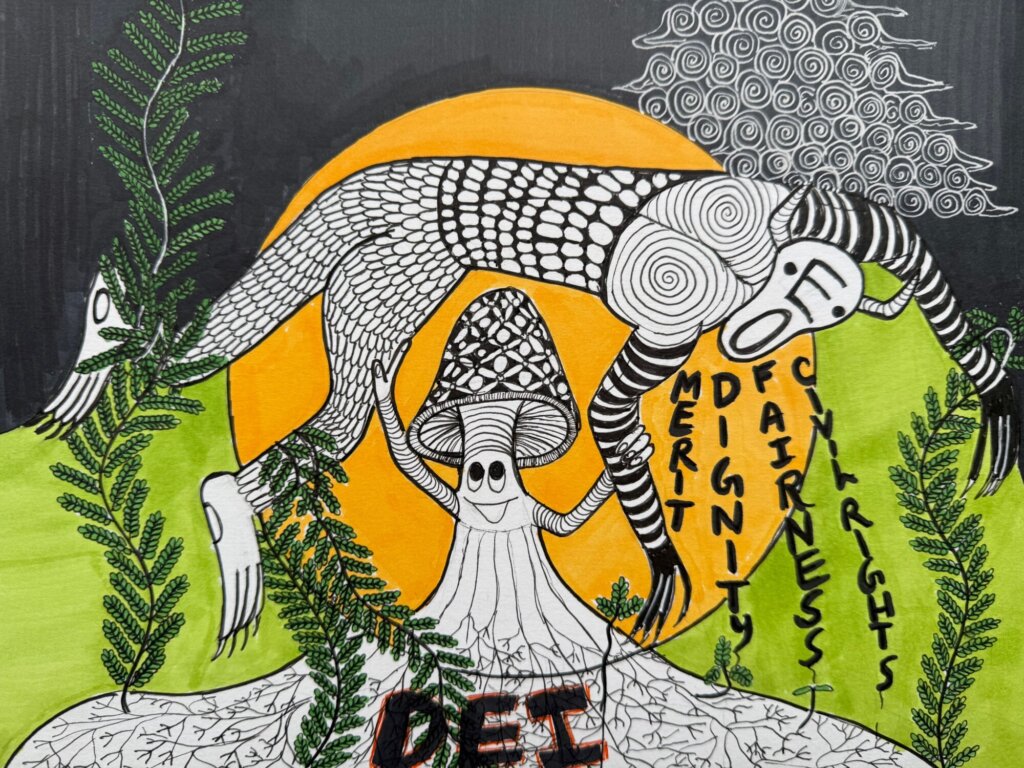Aparna
Published on
02 - 04 - 2025
Aparna
Published on
02 - 04 - 2025

Dear Avarna community,
The political attack on DEI has escalated in the past two weeks, with Executive Orders and memoranda dismantling federal DEI offices, encouraging employees to inform on DEI supporters, demanding lists of DEI contractors (including us), attempting to block funding to any DEI-related programming and education, and even purporting to criminalize our work.
To help our community get ahead of anticipated attacks, we published a blog post last summer and hosted a webinar in December offering our analysis of the legal landscape and some strategies to continue advancing our collective work. If you haven’t watched the webinar, you can watch it below.
While much of what we covered in the blog post and webinar still applies, we want to offer some reflections on these past two weeks, additional recommendations, and resources to help you move forward. Note that this is not legal advice.
It’s normal to feel anxious and concerned. We’ve also experienced a range of emotions, from receiving Stop Work Orders from our government clients to seeing dedicated federal colleagues placed on indefinite leave.
The explicit aim of these actions has been to stoke the 4 C’s of chaos, confusion, cognitive overload, and constitutional challenges. The sheer volume of EOs across various policy areas creates chaos, vague language fosters confusion, information overload clouds decision-making, and constitutional challenges are an attempt to bypass Congress and push through legally indefensible policies.
Ultimately, the 4 C’s are meant to hide the truth that these Executive Orders don’t legally dismantle DEI. Lawyers note that these EOs also don’t change existing discrimination laws like Title VII of the Civil Rights Act or ban private-sector DEI programs. While the EOs’ gratuitous use of terms like “illegal,” “unlawful,” “immoral,” and “pernicious” is meant to mislead, the Executive Branch has yet to provide any clarity on how it can single-handedly outlaw DEI or mandate that nonprofits and private companies stop their DEI efforts. In fact, the EO titled Ending Illegal Discrimination and Restoring Merit-Based Opportunity “encourages,” but does not mandate, DEI cessation in the private and nonprofit sectors. In addition, Executive Orders alone can’t change laws or regulations and generally require follow-up actions for enforceability.
Most nonprofits and private companies that do not depend on federal funding or contracts are well-positioned to reinforce their commitment to DEI and show solidarity with those impacted by federal changes because they are less vulnerable to attacks than federally funded organizations.
Any frivolous investigations stemming from the “Ending Illegal Discrimination…” EO’s demand that agencies make hit lists of “up to nine” organizations will likely be directed at large visible nonprofits and funders, universities with major endowments, major corporations (likely with national and international reach), and the financial sector. Even if future legislation targeting nonprofits—such as the Stop Terror-Financing and Tax Penalties on American Hostages Act (which is now in the Senate)—is passed, it would likely affect organizations engaged in high-profile social justice advocacy rather than general DEI efforts.
Nonprofits and private companies also have First Amendment rights to promote their DEI values through corporate speech, workplace policies, and training programs under the Supreme Court’s 2006 decision in Rumsfeld v. Forum for Academic and Institutional Rights, Inc. That right extends to advocacy and political expression under the 2010 Citizens United v. FEC case, where the Supreme Court held that 501(c)(4) nonprofits and corporations have the First Amendment Right to spend unlimited amounts on political speech. While we oppose the idea of granting corporations the same rights as individuals, one silver lining of Citizens United is that the decision’s broader implications may now offer some protection for nonprofits engaged in DEI work, especially if it’s tied to advocacy or political expression.
What should you do? Here are our recommendations:
We know these times are turbulent and challenging, and the sands keep shifting under our feet, but your efforts to support DEI are needed now more than ever. Stay focused, stay informed, and continue to move forward with resilience.
In solidarity,
-The Avarna Team
Dear Avarna community, We’re only four months into four years of this presidential administration, and the attacks on everything our…
Read full post about Staying the Course: On EOs, Education, ERGs, and SailingAvarna Community, It is with nearly all the emotions you might find in an emotions wheel that I am announcing…
Read full post about Farewell, AvarnaThe current administration’s anti-DEI Executive Orders have sparked varied responses in the nonprofit and private sectors—some organizations are defending DEI…
Read full post about DEI Jujitsu: Flipping the Backlash to Reframe Our Work

